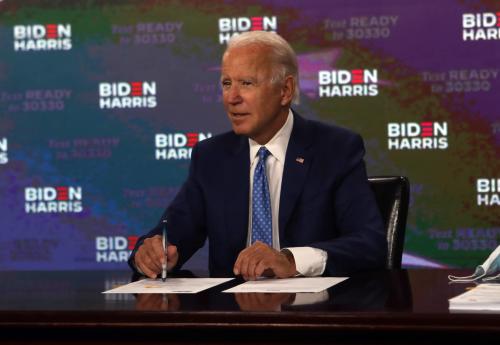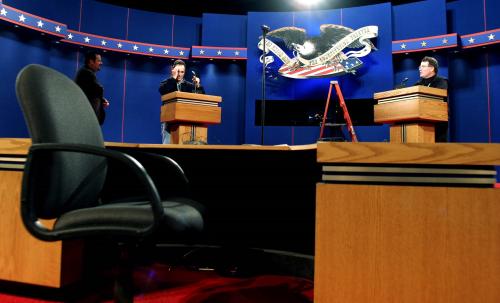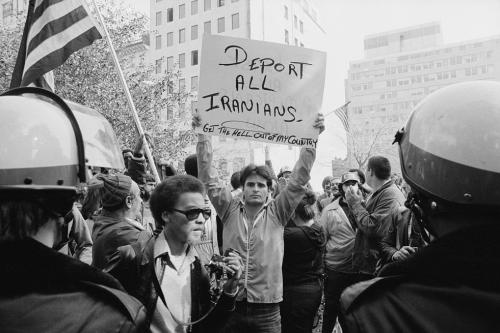When former Vice President Joe Biden steps on the stage for his first debate with President Trump, some of us will harken back forty years to another presidential debate and the lessons it taught.
On October 28, 1980, President Jimmy Carter met for the one and only debate with his challenger, former California Governor Ronald Reagan. Like Donald Trump, Carter was a first-term president whose path to re-election was challenging, to say the least. Carter’s average approval rating (over the length of his term) stood at a paltry 45.5%, the lowest of all the postwar presidents with the sole exception of—you guessed it—Donald Trump, whose overall average approval rating is 40%.
It’s hard to imagine two more different men than Jimmy Carter, the humble and devout Christian peanut farmer from Georgia, and Donald Trump, the flashy real estate tycoon. But the circustances of their presidencies and the stakes in their debates are similar.
In the last year of their first terms, both men faced crises for which they and the country they led were unprepared. For Trump, of course, it was the novel coronavirus. This virus and its associated policy problems, which required the careful coordination and implementation of disparate governmental authorities, would have been challenging for even the most experienced president. But it has proved to be overwhelming for a man who had no prior public sector experience.
For Carter it was the Iranian hostage crisis of 1979, where 52 Americans were held hostage in the American embassy in Tehran from November 4, 1979, to January 20, 1981. This was America’s first major experience with Islamic radicals, and Carter’s attempts to negotiate went nowhere, as the formal government in power in Iran had little control over the radical students holding the hostages. In April 1980 Carter resorted to a daring military rescue operation which failed spectacularly, killing U.S. military personnel as aircraft crashed in the desert before ever reaching Tehran.
For Trump, the coronavirus wiped out his biggest advantage: an economy with low inflation and low unemployment. As the country closed down over the virus unemployment rose, and as the virus drags on, millions of unemployed workers have begun to fear that they will never return to work. Carter’s election year was also marred by economic trouble. By January 1980 the country was in recession. On his watch the inflation rate soared into double digits and unemployment rose, an uncommon occurrence in economics.
And while it could be argued that neither man was responsible for the catastrophes befalling the country, the country found their leadership lacking. Trump has been widely criticized not just for his lack of competence but for his lack of empathy for those suffering from the virus and his repeated attempts to downplay the seriousness of the virus. Carter was criticized for his response to the economic pain, which he made in a speech that was widely panned and became known as the “malaise” speech.
Like Carter, Trump has found himself on the eve of the debates behind in the polls and virtually helpless to engineer an “October surprise” that would change the game. The Carter administration kept up its attempts to free the hostages, to no avail—the Iranian radicals simply wouldn’t cooperate. Similarly, the Trump administration has kept up its attempts to get past the virus but the virus won’t cooperate either. Early failures allowed it to run amok. And it keeps on killing, this time in red states, and a vaccine before Election Day remains an aspiration that serious public health experts and pharmaceutical companies say is not feasible.
When an incumbent president is in this kind of trouble, they only have one option and that is to make the challenger even less palatable. The Carter campaign went for broke, dispensing political appointees across the country to argue that Reagan was dangerous: a racist and someone who would lead the country into a war, someone too radical to have his finger on the nuclear button. They were playing the only hand they had, trying to make the challenger out to be even worse than the incumbent. Trump has been doing this to Biden all year long, even when it looked like Biden would not be the eventual nominee. He has tried to paint Biden as old, weak, and not up to the job—hence “sleepy Joe.” And he’s tried to convince America that Biden will ruin the American way of life, especially in the suburbs.
However, when Reagan took the stage on the night of October 28, 1980, America did not see a dangerous, radical war-monger. They saw an avuncular, kind man who could look right into your living room and ask the killer questions:
“Are you better off than you were four years ago? Is it easier to go and buy things in the stores than it was four years ago? Is there more or less unemployment in the country than there was four years ago? Is American as respected throughout the world as it was? Do you feel that our security is as safe? That we’re as strong as we were four years ago?”
After that debate the dam broke. On November 4 Reagan beat Carter by 9 points, winning all but six states and the District of Columbia.
Next week, Joe Biden’s sole job in his first debate with Trump will be to show America that he is not a dangerous radical or a socialist. Biden must show that he is strong enough to do the job and steady enough to keep from becoming a “Trojan horse” for the radical left. In fact, he should come up with his own version of “Are you better off than you were four years ago?” If he can pull this off, Joe Biden has a good chance of following in the electoral tracks of Ronald Reagan.







Commentary
In the upcoming presidential debate, can Biden pull a Reagan?
September 25, 2020